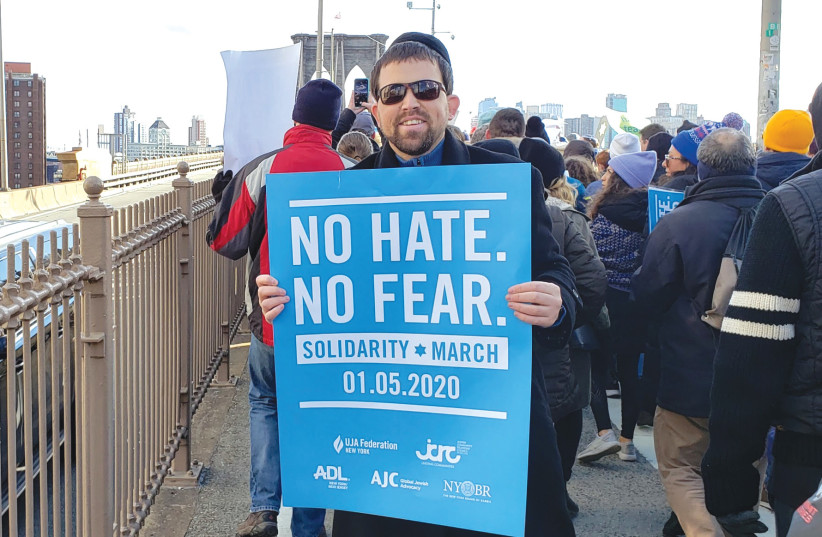In a famous letter to the Jews of Newport, our newly elected president, George Washington, expressed his aspiration that every Jewish person in America would “sit under his vine, and under his fig tree, and there shall be none to make him afraid,” a reference to the prophet Micah. In many ways, that fervent desire has been fulfilled since the founding of the republic.
But more recently, fear has begun to creep back, starting with the massacre at the Tree of Life Synagogue, and the shootings in Poway, Jersey City, and Monsey. Then, just a few months ago, the hostage-taking incident in Colleyville sent shock waves through the Jewish community nationwide.
Antisemitism is spiking all across America. In April, the Anti-Defamation League (ADL) recorded more than 2,700 antisemitic incidents – the highest level on record since the ADL began tracking these types of events in 1979.
Suddenly, we are not just afraid – we are terrified. We need to know that whenever and wherever we gather, we are protected from those who seek to do us harm.
In the Torah, Noah is told to build an ark before it rains. Right now, we’re planning for what could, in the worst-case scenario, be a flood of additional attacks.

Jewish Federations have just launched a bold, innovative, systematic approach called LiveSecure, which will ensure that every Jewish community has a comprehensive plan for its security, overseen by a professional security director. A state-of-the art command center in Chicago monitors incidents of concern across the country on a 24/7 basis and coordinates with the FBI, state and local law enforcement. Before long, every community will have the training, equipment, and know-how to defend against any and all attacks, whether physical or cyber in nature.
But this all takes a massive, long-term investment in safety and security, one in which the entire Jewish community needs to participate. Our history has taught us that these kinds of challenges are a recurring feature of Jewish life.
That is one reason the Jewish Future Pledge is so crucial for the future of our community. While we direct resources to the urgent matters we face today, the Pledge is inspiring global Jewry to ensure that Jewish life and Israel will thrive for generations to come. We must both satisfy the immediate needs of the present while planning for the future.
By committing to bequeath half of the amount that they leave to charity to Jewish or Israeli causes, donors at every level (there is no minimum financial commitment) will perpetuate a legacy of supporting the Jewish community. At the same time, donors are asked to share their wisdom, values, and life lessons, thus continuing to serve as vital Jewish role models long after they are gone.
There is an extraordinary amount of money at stake, given that the baby boomer generation is the wealthiest in American history. Demographers have found that, because of the unusually large size of their generation, their levels of education, and their participation in the workforce, Boomers have collectively earned $3.7 trillion, which is more than double the amount earned by the Silent Generation.
Freedom from fear is an existential issue for the organized Jewish community. We must ensure that all Jewish organizations have state-of-the-art security equipment, the highest expertise, training and other resources needed to mitigate potential attacks.
Just as we did in raising money to help Jewish communities to survive the pandemic, we are providing matching funds to Federations to enable them to implement comprehensive, best-practices-based security plans.
There are significant, long-term challenges that we face. Recent surveys show that the vast majority of younger American Jews do not believe that being part of a Jewish community is an essential part of being Jewish. We must find ways to engage them, beginning in their teenage years and throughout the rest of their lives.
There is an urgent and growing need to support Jewish and Israeli causes that are finding innovative ways to accomplish this. Without the active and sustained participation of the younger generation, we cannot feel confident and secure that Jewish life has a future.
Perhaps we need to develop new Jewish rituals that point the way forward. How about kindling an additional candle on Friday nights to light our path to the Jewish future? Our sages teach that rather than waiting for our broken world to be redeemed, we must do everything in our power to bring a new world into being.
Signing the Jewish Future Pledge demonstrates not just fealty to the past, but faith in the future and a determination that Jewish life will be not just liberated from fear and vulnerability, but zestful, compelling, relevant, and dynamic for many years to come – and perhaps most importantly: secure.
Mike Leven is a businessman, philanthropist and co-founder of the Jewish Future Pledge. Julie Platt chairs the LiveSecure Initiative at the Jewish Federations of North America and is the incoming chair of JFNA’s Board of Trustees.
